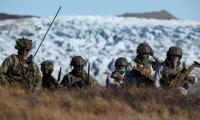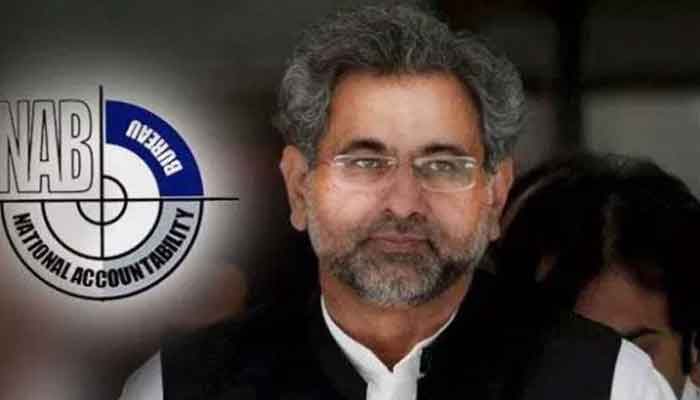NAB’s questions and Shahid Khaqan Abbasi’s answers
NAB in its questionnaire referred to some audit objections and also asked what Nawaz Sharif’s interest was in the LNG deal with Qatar. Questions about the role of Shahbaz Sharif and Saifur Rehman were also asked.
ISLAMABAD: The National Accountability Bureau (NAB) had no specific allegation of corruption against Shahid Khaqan Abbasi before his arrest on Thursday, as the questionnaire that was served on former prime minister regarding the LNG deal was more like trying to understand the complicated subject than probing any concrete clue of alleged corruption.
Taking full responsibility of the LNG deal, Abbasi told the NAB that LNG at $70 Brent provides a minimum of $2 billion in annual cash savings for Pakistan if it is used just to replace current highly inefficient furnace oil generation.
He told NAB that no violation of PPRA rules has been made in the LNG deal, which he insisted has been negotiated at the lowest possible price. In his written reply to NAB, Abbasi said, “13.37 percent Brent for 3 MTPA LNG quantity is a substantially lower price than other countries, which had contracted for much higher volumes of LNG — Japan, 40 MTPA at 14.5 percent Brent; India, 9 MTPA at 14.3 percent Brent (renegotiated to 13.9 percent Brent after Pakistan SPA); and Korea, 11 MTPA at 14.25 percent Brent.”
NAB in its questionnaire referred to some audit objections and also asked what Nawaz Sharif’s interest was in the LNG deal with Qatar. Questions about the role of Shahbaz Sharif and Saifur Rehman were also asked.
The NAB asked Abbasi about “Role of then prime minister Nawaz Sharif in LNG matters vs personal/business relationship with Qatari Emirs. What is relationship of Saifur Rehman with Sharif family and his connection in LNG Qatar Deal?”
Shahid Abbasi responded, “The then prime minister Nawaz Sharif had no personal role or relationship in the G (govt) to G procurement of LNG from Qatar. In his official interaction as prime minister with the Emir of Qatar during his 2015 visit to Pakistan, the issue of LNG pricing was part of the discussions. Qatar deals with its LNG customers through the executives of its state-owned petroleum company, Qatar Petroleum, and its subsidiaries; there is no negotiation with or involvement of any Qatari Emir or any other third-party in the G to G procurement process. Saifur Rehman has been personally known to me for over 35 years since he was a businessman in Saudi Arabia, and he has been a businessmen in Qatar for over 30 years. He has served as a Senator and Chairman Ehtesab Bureau in the government of then prime minister Nawaz Sharif from 1997 to 1999. I am not aware of any other relationship that he may have with then prime minister Nawaz Sharif. Saifur Rehman never had any connection of any kind with the procurement of LNG from Qatar on G to G basis which was strictly negotiated in a completely transparent manner by the executives of the nominated companies of the governments of Pakistan and Qatar without any third-party involvement.”
The NAB asked about the “role of then Punjab chief minister Shahbaz Sharif in LNG Qatar deal with Qatari Emirs with perspective to Qatari letter given by Qatari Emirs to then prime minister Nawaz Sharif/Hussain Nawaz.” Abbasi was asked how he could dispel the said impression and apprehension.
In response to the above question from NAB, Abbasi said, “The then Punjab chief minister Shahbaz Sharif had no personal role or relationship in the G to G procurement of LNG from Qatar; this was a federal government procurement and the government of Punjab had no role in the G to G procurement process. However, the Punjab CM during a wide-ranging meeting with the Emir of Qatar in 2015 made a request for a 13 percent Brent LNG price for Pakistan. Qatar deals with its LNG customers through the executives of its state-owned petroleum company, Qatar Petroleum, and its subsidiaries; there is no negotiation with or involvement of any Qatari Emir or any other third-party in the G to G procurement process. The SPA (sales purchase agreement) with Qatar had been negotiated and signed much before the so-called ‘Qatari letter’ as noted in this question. The Qatari entities and executives in the LNG negotiation process always dealt with their Pakistan counterparts in a professional corporate manner with complete transparency and without any hint of influence.”
NAB sought Abbasi’s comments on audit para - purchase of LNG at higher rate without exploring opportunities for the most economic deal. The auditors observed that the price negotiated with Qatar was at a higher rate as Qatar was source supplier of LNG whereas trading companies in open market were offering average rates lesser than the one finalised with Qatar. Hence, the public money could have been saved, had open competition been followed and complete facts of the open market/other LNG producing countries submitted to ECC for consideration.
Former prime minister Abbasi responded, “These audit paras are based on a simplified misunderstanding of the complex market based LNG procurement process. The rates in the table (mentioned in the audit report) are for some of the Spot LNG purchases made by Pakistan, which vary according to market demand and supply conditions, availability of LNG cargoes, and seasonal considerations. Pakistan has also paid substantially higher than these rates, in excess of 17 percent Brent, for Spot LNG purchases. The baseload requirement of LNG, which is a critical energy supply for Pakistan, cannot be left open to the market conditions, availability, and price volatility of Spot LNG. Term contracts with binding supply commitments are the only secure solution for LNG needs and all countries strive to have long term LNG SPA’s to secure their energy future. The short-term, 5 years, 1 cargo per month MSPA, price discovery of 13.37 percent Brent through a bid process was used to negotiate the 15 years, 5 cargo per month SPA with Qatargas down to the 13.37 percent Brent level; this is unprecedented in LNG negotiations worldwide.”
Referring to another audit report- non approval of LNG project from cabinet as per prime ministerial directives-, the NAB again sought Abbasi’s comment, who responded, “The Economic Committee of the Cabinet (ECC) gave approval to execute the SPA with Qatargas as per the recommendations of the PNC on January 13, 2016. All ECC decisions are, as a matter of record, ratified by the Cabinet. Any additional information required on the ECC or Cabinet decisions should be available with the Cabinet Division and Ministry of Energy (Petroleum Division); however, I have no access to this information.”
Abbasi told NAB that Pakistan has been pursuing Two Pipeline Gas Projects for over two decades without success; the Iran-Pakistan (IP) pipeline gas project is held up due to international sanctions on Iran, and the Turkmenistan-Afghanistan-Pakistan-India (TAPI) pipeline gas project is held up due to the security situation in Afghanistan. He added that the price of natural gas from both these projects, based on complex pricing formulas, equates to over 14 percent of Brent on comparative delivered basis.
“Various efforts have been made since 2005 to create an LNG supply chain for Pakistan but all failed. The PML-N government successfully created the whole LNG supply chain within 20 months, and the system currently delivers LNG into the system at less than $9.2/MMBTU at a $70 Brent,” he added.
He told NAB that the reality is that the LNG supply chain created by the PML-N government generally delivers LNG at about 15 percent less on Rs/MMBTU basis than comparative HSFO/LSFO cost. Several feasibilities and reports have been done by MP&NR and Ministry of Planning and Development on the need for Natural Gas and Liquefied Natural Gas (LNG) since 2005.
Abbasi maintained that Qatar is the largest producer of LNG in the world and the only producer with free volumes of LNG, especially in the quantity as required by Pakistan. Pakistan had been attempting to negotiate procurement of LNG with Qatar on G to G basis since 2005 but the efforts were not taken seriously as Pakistan did not have LNG regasification facilities. The decision to allow procurement of LNG from Qatar on G to G basis was made by the ECC in 2013 and a LNG Price Negotiation Committee (PNC) was constituted for the purpose. In 2013, Qatar was the only LNG producer in the world, which could supply a minimum of 4 LNG cargoes per month on long-term basis as required by Pakistan; there was no other reliable choice available to Pakistan for procurement of LNG except Qatar.
In addition, Abbasi said, long-term LNG Sale and Purchase Agreements (SPA) require extended negotiations, which under PPRA rules and regulations can only be done through a G to G procurement process. There is no example of a long-term LNG SPA in the world contracted through an auction or tendering process. In fact, in 2017 Pakistan was the first country in the world to sign a long-term 1 LNG cargo/month Master SPA (MSPA) with Eni, an Italian company, through a tendering process; this MSPA was based on the Qatar SPA which had been earlier negotiated.
NAB asked who made decision for G to G agreement other than Spot buying or open auction. What benefits have been made in agreement with Qatar by G to G agreement which could not have been achieved in open auction.
Abbasi replied, “The decision to contract for natural gas or LNG from any country or organisation on G to G basis rests with the ECC. In 2013, there was no other choice to procure LNG except through a G to G agreement with an underlying SPA; no long-term SPA had ever been contracted in the world through an auction process due to the unique capabilities and specifications of each LNG producer, and Spot buying can only be used for short-term one-off LNG procurement in low volumes as availability cannot be guaranteed and price is volatile as has been Pakistan’s experience in the last 4 years. There was no other reliable choice available to Pakistan in 2013 for procurement of LNG except Qatar.”
Abbasi was asked whether PPRA Rules & Regulations have been followed while going for G to G agreement for import of LNG and how. He responded, “All PPRA Rules and Regulations were followed in the import of LNG from Qatar on Government to Government basis and the procurement was compliant with PPRA Rules.”
He added that no exemption from PPRA Rules/Regulations was required from PPRA Authority for G to G Agreements or procurement without open auction under G to G agreements as per Rule 5 of the PPRA Rules, 2004. However, for negotiated procurement under G to G agreements, the ECC grants authorisation. The ECC vide its decision dated July 2, 2013, authorised the MP&NR to negotiate with Qatargas on G to G basis for importing LNG up to 500 MMCFD on DES basis. Accordingly, Pakistan State Oil (PSO) and Qatargas Operating Company (Qatargas) were nominated by the respective governments to negotiate the LNG Sale Purchase Agreement (SPA).
NAB asked Abbasi, “Have you satisfied yourself from other sources about pricing of LNG? Give documents of that time.” The former PM responded, “All possible efforts were made to check on the sources and prices of LNG. Yes, I am satisfied that the Qatar SPA provided Pakistan with a secure baseload supply for its critical long-term LNG needs in the most transparent manner from the world’s largest LNG producer and most reliable premium supplier at the best price in the market. The biggest proof that the PNC was able to negotiate the best price under the flexible, 4 LNG cargo per month, 15 years Qatargas SPA is that it is the same price of 13.37 percent Brent that was obtained through a competitive tender process for a much less flexible, 1 LNG cargo per month, 5 years MSPA with Gunvor. Moreover, the lowest bidder, Shell, in a parallel competitive tender process for a 1 LNG cargo per month, 5 years MSPA was offered the opportunity to match the 13.37 percent Brent price but it refused to match the price; this is clear proof that the Qatargas SPA price was the most competitive price in the market.”
NAB asked Abbasi who was FGE (Energy consultant). “Have you satisfied yourself regarding rating of FGE before accepting their nomination as International Consultant for Pricing of LNG? How, give brief reasons along with previous experience in LNG pricing etc.?
Abbasi replied, “FGE was acknowledged to be one of the top LNG consultants in the world and was selected through a stringent competitive procurement process by USAID under its Energy Policy Program (EPP) for Pakistan. There was no doubt on the ability of FGE to be able to provide the required services and assistance for LNG procurement for Pakistan based on their selection by USAID, their reputation in the market, and their experience. FGE experience, knowledge based, and competence statement is available on their website fgenergy.com.”
NAB asked about the procedure for selection of FGE as International Consultant for Pricing of LNG. How much payment had been made and who paid.
Abbasi responded, “FGE was selected by the USAID for assistance with LNG pricing through its transparent and competitive contracting process under the Energy Policy Program. The assessment or analysis provided by FGE were not binding or mandatory in any manner; they were provided to help the government of Pakistan and its subordinate entities to gain knowledge of industry best practices and market conditions for procurement of LNG. All payments to FGE for its services were made by USAID under its Energy Policy Program. No government of Pakistan funds were involved.”
When asked about the role of the then Secretaries MP&NR (Abid Saeed & Arshad Mirza) in decision making of PNC and negotiation of LNG pricing with Qatar, Abbasi said, “Secretaries MP&NR, both Abid Saeed and Arshad Mirza, were administratively responsible for the work in the Ministry as per the government Rules of Business and performed their functions with integrity and competence. They were also chairmen of the LNG Price Negotiation Committee (PNC) and took part in the deliberations of the PNC; the deliberations of the PNC are available in the attached minutes of the 15 PNC meetings held from 2014 to 2016. Committees like the PNC provide a forum for collective decision making, it is not possible to classify any member of a committee as active or non-active; especially the chairman of a committee which performs its work diligently and produces results cannot be classified as non-active.”
-
 Drew Barrymore Gets Candid About The Words That Haunted Her Childhood
Drew Barrymore Gets Candid About The Words That Haunted Her Childhood -
 Why Fans Fell For Scammers Impersonating Reese Witherspoon
Why Fans Fell For Scammers Impersonating Reese Witherspoon -
 'Stranger Things' Star David Harbour Opens Up About Manic Episodes
'Stranger Things' Star David Harbour Opens Up About Manic Episodes -
 Elon Musk Predicts That Solar Power Can Supply The Global Demand For All Of Humanity’s Energy
Elon Musk Predicts That Solar Power Can Supply The Global Demand For All Of Humanity’s Energy -
 Keith Urban Takes Extreme Measures To Not 'air Dirty Laundry' Post-Nicole Kidman Divorce
Keith Urban Takes Extreme Measures To Not 'air Dirty Laundry' Post-Nicole Kidman Divorce -
 Louis Tomlinson Reveals Hidden Anxiety
Louis Tomlinson Reveals Hidden Anxiety -
 Defying Age At Milano Cortina Games: Canadian Skater Stellato-Dudeke Aims For Gold At 42
Defying Age At Milano Cortina Games: Canadian Skater Stellato-Dudeke Aims For Gold At 42 -
 Study Finds Screen Time Does Not Harm Teenagers’ Mental Health
Study Finds Screen Time Does Not Harm Teenagers’ Mental Health -
 'Dunesday': What Robert Downey Jr. And Timothee Chalamet Really Think
'Dunesday': What Robert Downey Jr. And Timothee Chalamet Really Think -
 UK Regulator Reaffirms Ongoing Investigation Into X Deepfake Probe
UK Regulator Reaffirms Ongoing Investigation Into X Deepfake Probe -
 'Marty Supreme' Featured Secret Robert Pattinson Cameo?
'Marty Supreme' Featured Secret Robert Pattinson Cameo? -
 ‘Operation Arctic Endurance’: Which NATO Nations Are Sending Troops To Greenland?
‘Operation Arctic Endurance’: Which NATO Nations Are Sending Troops To Greenland? -
 Kate Middleton ‘disgusted’ As Andrew Points Finger At Her Over Royal Downfall
Kate Middleton ‘disgusted’ As Andrew Points Finger At Her Over Royal Downfall -
 YouTube Adds New Parental Controls For Teens, Limits Shorts Scrolling
YouTube Adds New Parental Controls For Teens, Limits Shorts Scrolling -
 Sarah Ferguson Takes Big Decision As Royal Lodge Eviction Looms
Sarah Ferguson Takes Big Decision As Royal Lodge Eviction Looms -
 Bruno Mars Leaves Taylor Swift Behind With Shocking Move
Bruno Mars Leaves Taylor Swift Behind With Shocking Move




